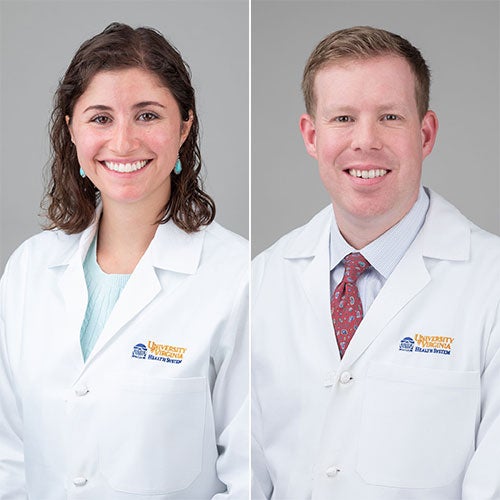
Jessica Dreicer, MD, (left) and Andrew Parsons, MD, MPH
University of Virginia School of Medicine educators are seeking to improve patient care, prevent medical mistakes and, ultimately, produce better doctors by enhancing how students are taught clinical reasoning, the process used to diagnose and treat disease.
Jessica J. Dreicer, MD, and Andrew S. Parsons, MD, MPH, are the co-directors of UVA Health’s new Clinical Reasoning Research Collaborative, which aims to foster collaboration among patients, clinicians, educators and scholars to advance understanding of clinical reasoning.
In a new paper, Dreicer, Parsons and colleagues argue that colleges can improve undergraduate medical education by distinguishing between two imprecise terms often used interchangeably to describe how doctors think when diagnosing and treating ailments: “framework” and “schema.” Dreicer and Parsons suggest an important distinction that can benefit young learners and help them become better clinicians.
Frameworks, they argue, are guidelines educators give to students to guide their thinking. For examples, a framework for diagnosing a particular illness might include its symptoms and the steps a doctor would take to make the correct diagnosis.
Schema, on the other hand, should describe how the learner or clinician ultimately thinks, Dreicer and Parsons argue. Schema are internal to the thinker, describing both what the person has learned and how the person applies it. So students with an inadequate schema for thinking about a complex illness may not benefit from frameworks they are not ready to process.
In their paper, the UVA doctors employ an aviation analogy to illustrate the importance of this distinction. Pilots, they note, often rely on checklists before flying. But checklists – a type of framework – do not make good pilots by themselves. Instead, pilots must incorporate not just their knowledge but real-time events and other factors in their schema – their thought processes that let them fly successfully and safely.
This fine distinction, the UVA doctors argue, can inform how educators teach and help them better prepare their students for their future careers. In turn, this will benefit patients by producing clinicians who are better equipped for clinical decision-making, helping them make correct diagnoses and determine the best courses of treatment.
